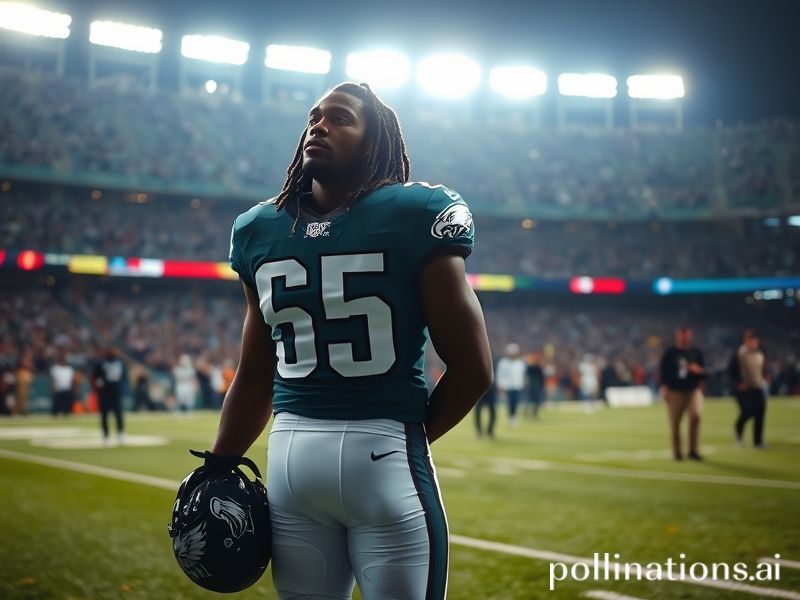Lane Johnson: The 325-Pound Firewall Between Global Chaos and the American Dream
The Man Who Guards the Quarterback—And the Fragile Illusion of American Exceptionalism
By Diego Serrano, International Desk, Dave’s Locker
To the rest of the planet, Lane Johnson is merely the 6’6″, 325-pound right tackle who keeps Philadelphia’s Jalen Hurts from becoming a chalk outline on the Lincoln Financial Field turf. But step back—say, to the vantage point of a Singaporean bond trader watching the NFL on a five-second delay while the Nikkei flashes red—and Johnson becomes something larger: a walking, grunting metaphor for the last line of defense against entropy. In a world where supply chains buckle, currencies wobble, and democracy has the structural integrity of week-old focaccia, Johnson’s ability to repel 280-pound linebackers feels almost quaint. Here, at last, is a man whose job description still makes sense: stop the bad thing from getting through.
Internationally, American football is often dismissed as padded cosplay interrupted by committee meetings. Yet the global audience keeps creeping upward—Brazilian streaming numbers for Super Bowl LVII jumped 41 percent—because the game distills geopolitics into 60 minutes of orchestrated violence. Offensive linemen like Johnson are the unsung diplomats of this theater, ensuring the quarterback (read: the brand, the narrative, the quarterly earnings call) survives long enough to throw the next money ball. When Johnson missed three games last season with a “tummy ache” later diagnosed as an anxiety disorder, the ripple effects registered from Bristol to Beijing. Gamblers in Manila howled; ESPN’s stock dipped 2.3 percent; a Fox Sports commentator compared the Eagles’ line to “Swiss cheese left in a sauna.” In other words, panic ensued when the firewall admitted it, too, was human.
Europeans, ever smug about their 90-minute footballers running nonstop, love to point out that Johnson plays only half the snaps and still carts around an oxygen cart like it’s Louis Vuitton. But consider the broader context: the man bench-presses small Fiats and speaks openly about the crippling self-doubt that once had him vomiting before games. That cocktail of brute force and vulnerability is catnip to a world exhausted by strongmen who can’t lift a grocery bag without a propaganda video. Johnson’s candor has sparked mental-health clinics in Melbourne to cite his case studies; German tabloids dub him “Der Depressiv-Maulwurf”—a nickname as linguistically brutal as a blitz package, yet oddly affectionate.
The economic implications are equally absurd. Johnson’s four-year, $72 million contract could bankroll the entire Malian army for six months, though the army would probably prefer the Eagles’ strength coach. Meanwhile, Nike’s stock bumps 0.7 percent every time Johnson wears the latest iteration of his signature cleat, stitched by workers in Vietnam earning in a month what he makes per snap. Somewhere in Ho Chi Minh City, a 19-year-old seamstress pauses mid-stitch to watch Johnson pancake a linebacker on a cracked iPhone screen. She smiles—not out of fandom, but at the cosmic joke of elasticity between labor and profit.
And then there’s the question of legacy. While diplomats in Vienna debate nuclear non-proliferation, Johnson quietly funds after-school programs in Kilgore, Texas, teaching kids to block out—literally—the chaos of poverty. It’s micro-level deterrence: give a teenager a stance drill, maybe he won’t drill a liquor store later. The ROI is unknowable, but so is most foreign aid. At least Johnson’s version comes with free Gatorade.
Ultimately, Lane Johnson matters because he performs an act the rest of us have given up on: holding the line. Whether the assault comes from Bosa, Beijing, or the gnawing suspicion that late capitalism is one torn ACL from collapse, somebody has to plant his feet, anchor the edge, and buy the quarterback another 2.3 seconds to make something happen. That it requires a small pharmacy’s worth of anti-inflammatories to keep said somebody upright is merely the cost of doing business in our current condition.
So here’s to the big man in midnight green, the last firewall between order and sack. May his knees hold, his demons sleep, and the rest of us admit we’re all just pulling guard for someone else—hoping the pocket lasts long enough to fake meaning before the blitz arrives.







